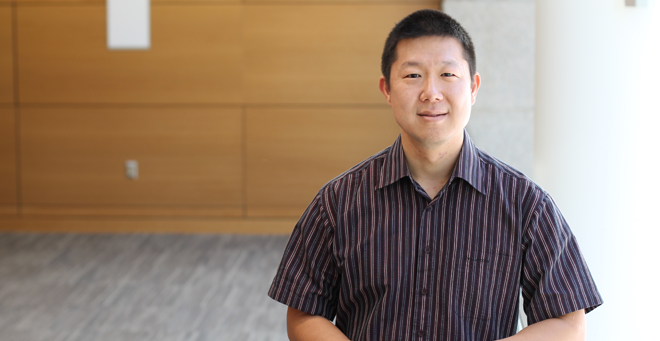 |
|
| Dohoon Kim, PhD |
Dohoon Kim, PhD, assistant professor of molecular, cell & cancer biology, was named one of five recipients of the 2017 Suh Kyungbae Science Foundation Young Investigator Awards. The honor comes with a $2 million grant over five years, which will support Dr. Kim’s research into changes in metabolic pathways that support cancer cells and their survival within the tumor environment.
“As a new PI, this grant really allows me to free my mind to think about all the different ways that toxic metabolites may be involved with various diseases,” Kim said. “It allows me to tell my lab that we shouldn’t limit ourselves, that we should run the best experiment we can run to get at these questions. It frees me to explore big concepts and create new paradigms.”
Kim joined UMass Medical School in November 2015, after completing his postdoctoral research at the Whitehead Institute at MIT and earning a PhD in cell and developmental biology at Harvard University. He received his bachelor’s and master’s degrees in biology from the Korea Advanced Institute of Science and Technology.
The Suh Kyungbae Science Foundation is a South Korean organization started in 2016 by Suh Kyung-bae, CEO of Amorepacific Group, and members of the scientific community. The primary purpose of the foundation is to serve as a platform from which to nurture and provide comprehensive long-term support for creative and passionate young Korean scientists committed to pursuing research in the life sciences. Suh-Yeon Choi, PhD, program professional with the foundation, said Kim’s research proposal recognizes the challenging task and is based on unique ideas that are logical and clearly described.
According to the foundation’s review committee, Kim’s research plan “has a unique viewpoint to interpret disease, especially the onset and treatment of cancer, from the perspective of the generation, degradation and transformation of metabolites.”
Kim has found that a significant number of metabolites naturally produced in cells have highly toxic properties, but normally have no consequences because they are quickly metabolized before they can accumulate. A goal of the Kim lab is to exploit these metabolites for therapeutic purposes.
“In every cell in our body we have a network of interconnected metabolic pathways, a subset of which involves the transient production of toxic metabolites. We aim to understand the role of these pathways, and to target them to poison cancer cells with their own metabolites,” Kim said. “Furthermore, as widespread changes in cellular metabolism accompany various pathological changes in cellular state, we are also interested in the potential contributing roles of toxic metabolites in disease contexts outside of cancer.”